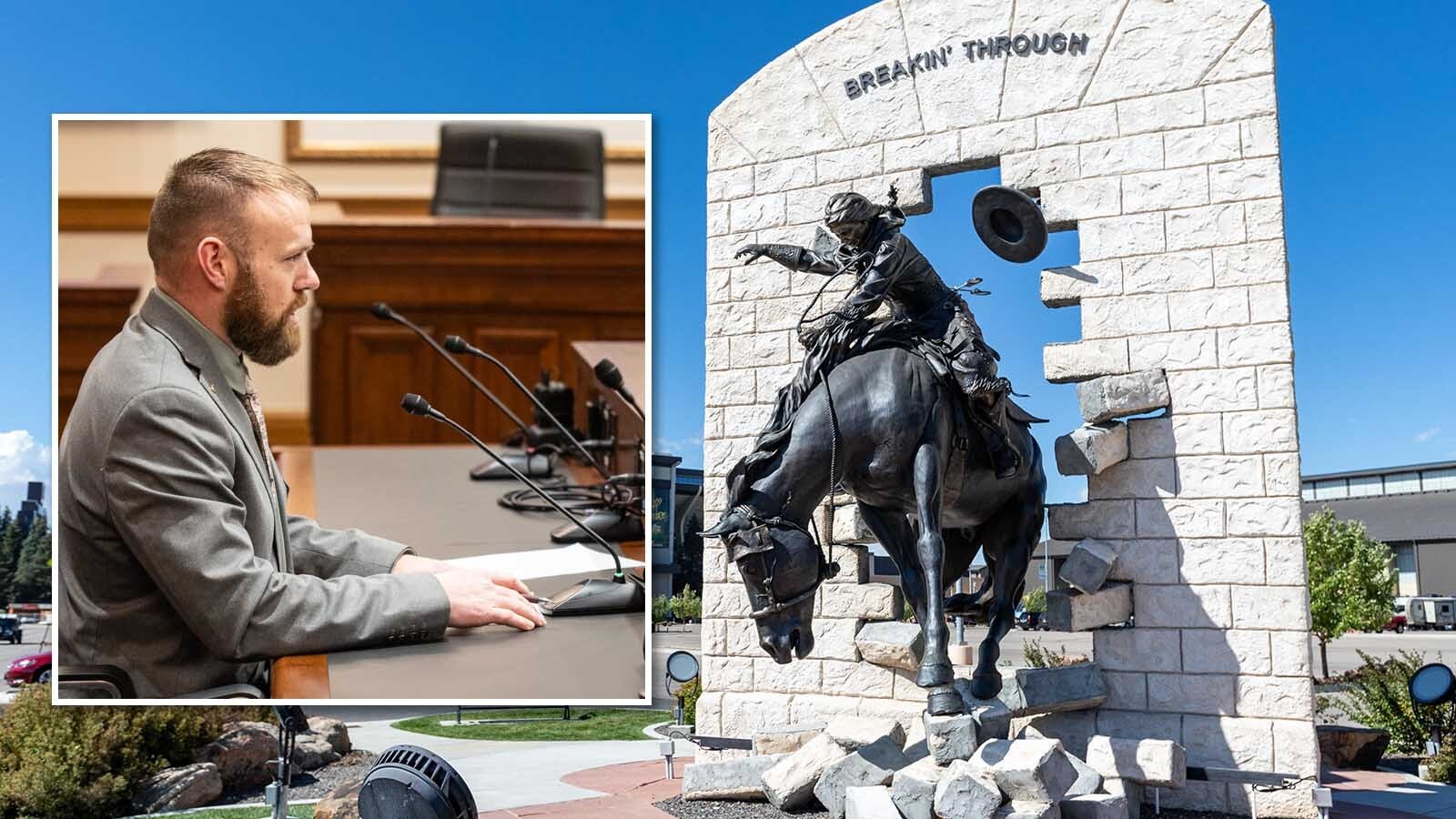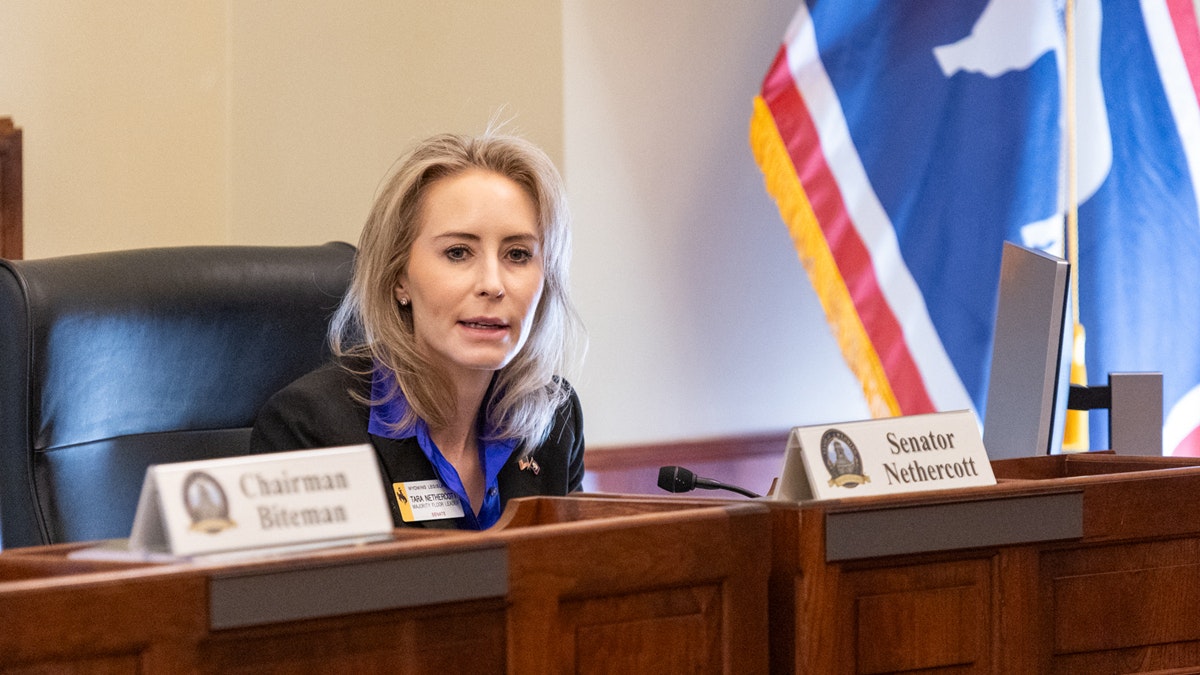Legislation that proposes to block investment into companies whose environmental and social governance (ESG) efforts could be undermining the very oil and gas industry that supports Wyoming ran into a wall of opposition during a Friday committee hearing.
Many of the state’s investment fund managers and Wyoming Treasurer Curt Meier said the bill is well-intended, but goes too far.
Wyoming’s pension fund could lose nearly $1.2 billion over the next three years if House Bill 80 goes into effect, Wyoming Coalition for a Healthy Retirement Coalition’s Ron Stiffen told lawmakers, while Meier said better than half of his staff are likely to walk out the door, claiming a material change to their contract.
Testimony about House Bill 80 was heard Friday by the House Minerals Business and Economic Development Committee, which took no action on the bill, instead continuing its deliberations on the bill to Monday, as a host of people lined up to testify against the bill.
Among those questioning the bill closely were Reps. J.R. Riggins, R-Casper, and Martha Lawley, R-Worland, both suggesting it could severely limit the state’s investment options and pose other unintentional problems.
Lawley, in particular, asked the bill’s sponsor, Rep. Christopher Knapp, R-Gillette, if he’d be amenable to a friendly amendment to spell out that the anti-ESG measure wouldn’t be triggered by a company’s internal policies between its employees, such as health care services, and that it would only kick in for something that’s been stated up front in the company’s investment portfolio goals.
Knapp said he would agree to such an amendment if it would help the bill’s chances.
In later testimony, however, Knapp also indicated that there should still be a responsibility on the part of Wyoming’s investment managers to ensure that the state isn’t investing in companies that are technically complying with Wyoming laws by not having any overt statements regarding any political agenda superseding profit motives, but whose underlying goal is still more overtly political or social in nature than profit-motivated.
“One of the issues that’s occurring, and where you’ll find much of the litigation going on today, is that there’s a misrepresentation with those corporations of having a non-ESG fund,” he said. “But (then) actually using that fund to promote ESG goals, and that would violate the law.”
Even Energy Companies Have ESG Statements
One of the problems with the bill that Meier pointed to is that many energy companies, even coal, have ESG statements.
Wall Street, in more recent times, has been requiring ESG statements from every company that wants access to its capital.
Because of that, all publicly traded companies, whether energy or something else, have developed such statements, whether oil and gas like ExxonMobile and Devon Energy or coal like Peabody Energy and Arch Resources Inc.
Even Continental Resources, which took its publicly traded company private in 2022, still has the equivalent of an ESG statement on its website. It has renamed it a “Corporate Culture & Sustainability” statement, but it still largely covers the same things an ESG statement would.
Wyoming itself, Meier told lawmakers, has in times past participated in efforts to reduce carbon emissions.
“If you look back at what we’ve done in Wyoming in the ’90s, we made provisions to be able to capture carbon with agricultural products,” he said. “There was a carbon market in London, which didn’t last long, but we would have been able to return money back to our farmers and ranchers for actually being in the greenhouse gas capturing business, because they are.”
PAW Not Taking A Position
The Petroleum Association of Wyoming (PAW) has not yet taken a position on House Bill 80, in part because the association wants to consider other ESG-related legislation that’s also in the pipeline, said PAW Chairman Pete Obermueller.
Obermueller said he first raised the issue two years ago because, at the time, there was something like $7 billion in total investment funding being handled by managers who had signed pledges to actively work toward specific greenhouse gas reduction targets by 2030.
These were “unrealistic expectations that the industry couldn’t meet,” Obermueller said. “And, in our opinion, are harmful to industry and harmful to the state.”
The problem he saw was particularly in the permanent Mineral Trust Fund and not so much in the retirement funds, he said.
“That oil and gas and other minerals put into the fund were being used by managers that were — our money was being used to back activist shareholder votes and other actions against us,” he said. “In our opinion, that was the crux of the issue.”
Obermueller said great strides have been made since then, and he appreciates the efforts Wyoming’s elected officials have made in that regard.
Obermueller also clarified that the bill won’t preclude investing in companies that are disclosing greenhouse gas emissions or reducing them.
“They’re doing it in order to differentiate themselves from their competitors in other states, particularly our natural gas producers, who sell natural gas to places on the West Coast, who know they need our natural gas but don’t love it,” he said. “And so, they’re looking for differentiated gas that they can purchase.”
He added he is concerned about the bill saying Wyoming couldn’t use its oil and gas invested money to invest in a company that’s doing those things.
Obermueller suggested placing the word involuntary into the bill text to distinguish that companies may take such actions for a competitive market advantage.
He also asked lawmakers to consider removing two subsections one of which dealt with investments made with the intention of further increasing access to abortion or transgender surgery and the other prohibiting investments made with the intention of limiting the sale of firearms and ammunition.
“I’d like to keep energy policy energy policy,” he said. “And I’ll leave it at that.”
Hamstringing Retirement Fund Investments
The overall bill is well-intentioned, Investment Funds Committee Vice Chair Celia Herbert told lawmakers during her testimony, but as written poses many problems for Wyoming’s retirement funds.
“I think as Reps. Riggins and Lawley have pointed out, (this bill) delves so deeply into specifics that it will be very hard to manage,” she said. “And I think the result would be micromanaging the investment portfolios to the detriment of the state.”
Existing language in state statutes and the constitution already spells out that the state’s financial investors must be strictly for the financial benefit of members, Wyoming Retirement System Executive Director David Swindell said.
“We are ESG agnostic,” he said. “We have never invested in an ESG fashion. I also think that the committee is broadly aware, as the bill sponsor mentioned, we’ve been very successful.”
As of June 30, Swindell said Wyoming Retirement System funds averaged 9.84% returns and beat the median fund by more than 200 basis points.
“The leverage is quite large,” he said, adding that 200 basis points on a $10 billion to $11 billion fund is adding $200 million a year in compounding interest.
“It’s important to understand that if you start to degrade your investment performance, compounding works the other way,” he added. “So, you start to lose money from what you potentially could have earned.”

Anti-ESG Policies Already Baked In
Meier told lawmakers his office has already “taken the bull by the horns” to ensure that Wyoming isn’t unthinkingly funding policies antagonistic to its oil and gas industries.
But, he added, the laws Wyoming has on the books about that have already interfered at times with investing in companies that he believes it would have made sense for the state to support with its investment portfolio.
“It’s confidential, so I can’t tell you what (companies) they are,” he said. “But we got to figure out some way, I would say, when it directly affects us, affects our natural resource industries, that there’s a way that we can invest in these.”
Meier later added that the opportunity came about because Europeans didn’t want to invest in a coal-fired power plant.
“They’re looking at other people, and what their main goal is, I think, is to get a group of states like us, Alaska, North Dakota, Texas, Florida … to be able to go out and buy these assets at a relatively cheap (price), and it’s not going to be as cheap as it has been in the last few years,” he said.
“That’s something that we need to contemplate going forward here,” Meier continued. “There’s a saying that my father and grandfather always told me, he says, ‘Don’t ever get mad at your money.’”
Meier said House Bill 80 is straying too far into that territory.
Costs Will Be Huge
Implementation of the rules contemplated by House Bill 80 will be costly and time-consuming, Meier and other critics told lawmakers.
“What’s the standard for us to determine whether or not we’re violating this?” he said. “Well, we would have to hire a mail clicking firm and someone to monitor every podcast, every conversation, every newspaper article, every one of the major people’s officers. That’s what’s in the law, regardless of how it might be operated.
“And I would say, be really careful about what you write because of the unintended consequences.”
It’s those unintended consequences that worry Wyoming Retirement System Vice Chair and Investment Committee Chairman Eric Nelson, who said that once Wyoming’s law is enacted, it will take on a life of its own through the interpretation of attorneys and courts of law.
He believes many investment firms will simply walk away from Wyoming’s business as a result of their attorneys’ legal interpretations, regardless of what Wyoming might say about the law’s true scope.
“The current wording of this bill gives the trustees as well as the staff, great pause,” he said. “The plain language of the bill I think could result in what I would characterize as catastrophic, unintended consequences.”
Meier, meanwhile, said that better than half of his staff are likely to walk out the door if the bill passes, because they will see it as a material change to their contract.
“They’re going to walk out the door and we’re going to be left with nobody to invest, no markets to invest in,” he said. “The Senate looked at that and understood that’s a reality. It’s no hyperbole. So, they understood it and got rid of the most troubling parts of what this bill has.”
Meier urged lawmakers on the House Minerals committee to review a copy of that bill and use it as a jumping off point for a substitute bill.
Roll Call
No votes were taken on House bill 80. The discussion was continued to Monday.
Renée Jean can be reached at renee@cowboystatedaily.com.





